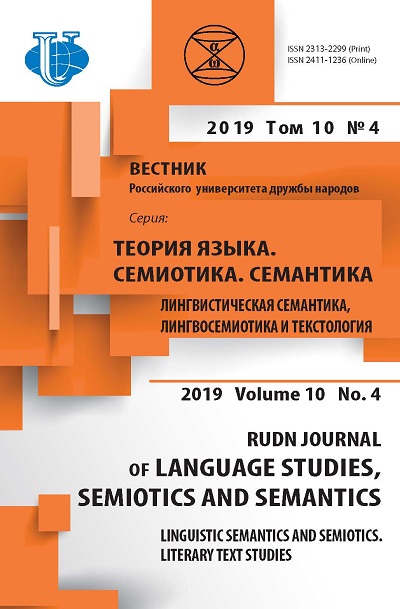Usual and Individual Authorial Functioning of Lexemes “Dream” and “Reverie” in Igor-Severyanin’s Poetry
- Authors: Shliakhova G.I.1
-
Affiliations:
- Maxim Gorky Institute of Literature and Creative Writing
- Issue: Vol 10, No 4 (2019): Linguistic Semantics and Semiotics. Literary Text Studies
- Pages: 1106-1115
- Section: LITERARY TEXT SEMANTICS AND POETICS
- URL: https://journals.rudn.ru/semiotics-semantics/article/view/22788
- DOI: https://doi.org/10.22363/2313-2299-2019-10-4-1106-1115
- ID: 22788
Cite item
Full Text
Abstract
The article contains the analysis of the mental sphere lexis in Igor-Severianin’s poetry. The lexemes “dream”, “reverie” belong to mental field and represent leitmotifs, sense-making components of the ego-futurist’s literature. The frequency of their use in Severianin’s poetic texts is several times higher than is modern Russian language, which allows to notice their particular role. Moreover, the comparison of contextual and usual (dictionary) meaning shows that in poems the word-picture acquires new senses and expands the semantic field. This is visibly demonstrated by the examples of author’s use given in the article. The mental sphere lexemes help to perceive Igor-Severianin’s individual style as well as his worldview that reflects principles of ego-futurism, the literary movement aestheticizing reality and bringing human imagination into the foreground.
About the authors
Galina I. Shliakhova
Maxim Gorky Institute of Literature and Creative Writing
Author for correspondence.
Email: galine_24@mail.ru
post-graduate student of the direction “Linguistics and literature”
Tverskoy Boulevard 25, 123104, Moscow, Russian FederationReferences
- Pimenova, M.V. (2012). Change of stereotypes in linguoculture, or a new look at the relics of ancient consciousness In And your word will respond: To the 80th anniversary of the birth of Dr. Filol. Sciences, Professor E.S. Otin. Kazan: publishing house of Dmitry Burag. (In Russ.).
- Kolesov, V.V. (2006). Theses on mentality, Uchenye Zapiski Kazanskogo Universiteta. Seriya Gumanitarnye Nauki, 148(2), 5—13. (In Russ.).
- Omelchenko, S.R. (2004). Functional-semantic characteristics of Russian mental verbs, Izvestija Ural'skogo gosudarstvennogo universiteta, 31, 217—229. (In Russ.).
- Arutyunova, N.D. (1993). Introduction In Logical analysis of language. Mental actions. Moscow: Nauka. (In Russ.).
- Ryabtseva, N.K. (1993). Mental modus: from vocabulary to grammar In Logical analysis of language: Mental actions. Moscow: Nauka. pp. 51—57. (In Russ.).
- Ivanova, G.F. (2007). Evaluation in the mental sphere of language, Vestnik of Saint Petersburg University, 9 (3-2), 143—150. (In Russ.).
- Gak, V.G. (1993). Space of thought (the experience of systematization of words of the mental field) In Logical analysis of language: Mental actions. Moscow: Nauka. pp. 22—40. (In Russ.).
- Lazareva, O.A. (2011). Description of Russian vocabulary: mentality, linguistic culturology, ideography, Vestnik of Lobachevsky University of Nizhni Novgorod, 6 (2), 368—371. (In Russ.).
- Likhachev, D.S. (1999). The conceptual sphere of the Russian language. In: Essays on the philosophy of artistic creativity. St. Petersburg: Blitz. pp. 147—165. (In Russ.).
- BAS — Dictionary of modern Russian literary language (1954). Vol. 3. Moscow, Leningrad: Publishing House of the Academy of Sciences of the USSR. (In Russ.).
- BAS — Dictionary of modern Russian literary language (1957). Vol. 6. Moscow, Leningrad: Publishing House of the Academy of Sciences of the USSR. (In Russ.).
- Ivanova, M.V. (1986). Alphabet-frequency index of word forms “Lives of Stephen of Perm”. The deposited manuscript number 24353 of 03.03.1986. Moscow: INION. (In Russ.).
- Ivanova, M.V. (1995). To the history of the interaction of the “book” and “non-book” in the vocabulary of the literary language at the turn of the XIV—XV centuries In Philological collection. To the 100th anniversary of the birth of Academician V.Vinogradov. Moscow. pp. 180—186. (In Russ.).
- Dal, V.I. (1880). Explanatory Dictionary of the Live Great Russian Language. Vol. 1. St. Petersburg—Moscow. (In Russ.).
- Dal, V.I. (1881). Explanatory Dictionary of the Living Great Russian Language. Vol. 2. St. Petersburg—Moscow. (In Russ.).
- Dictionary of the Russian language (XI—XVII centuries) (1982). Issue 9. Moscow. (In Russ.).
- Dictionary of the Russian language (XI—XVII centuries)(1997). Issue 4. Moscow. (In Russ.).
- Fasmer, M. (1986). Etymological dictionary of the Russian language. Vol. I. Moscow: Progress. (In Russ.).
- Severyanin, I. (2014). Complete Works in one volume, Mikhail Petrov (Ed.). Moscow: Alpha-book. (In Russ.).
Supplementary files












